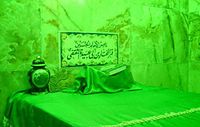- Al-Mukhtar
-

Beliefs and practices Succession of Ali
Imamate of the Family
Mourning of Muharram
Intercession · Ismah
The Occultation · ClergyViews The Qur'an · Sahaba
Mu'awiya I · Abu Bakr
Umar · GhulatHoly days Ashura · Arba'een · Mawlid
Eid ul-Fitr · Eid al-Adha
Eid al-Ghadeer
Eid al-MubahilaHistory Twelver · Ismāʿīlī · Zaidi
The verse of purification
Mubahala · Two things
Khumm · Fatimah's house
First Fitna · Second Fitna
The Battle of Karbala
PersecutionAhl al-Kisa Muhammad · Ali · Fatimah
Hasan · HusseinSome companions Salman the Persian
Miqdad ibn Aswad
Abu Dharr al-Ghifari
Ammar ibn Yasir
Bilal ibn Rabahal-Mukhtār ibn Abī ‘Ubayd Allah al-Thaqafī (Arabic: المختار بن أبي عبيد الله الثقفي) (622 CE - 687 CE)(Also Mukhtar bin Abu Ubaid) was an early Islamic revolutionary who led an abortive rebellion against the Umayyad Caliphs after the death of Husayn ibn Ali at the Battle of Karbala.
Contents
Life
Al-Mukhtar was born in Ta’if, Makkah Province, Saudi Arabia in 622 CE, 1 AH, the year the Islamic prophet Muhammad began the Migration to Medina. He went to Medina along with his father during Umar's Caliphate. He was the son of a martyr in the Battle of Yamul Hajr, and grew up in Medina while it was under the rule of Muhammad.
When Yazid I, the second Umayyad Caliph, took power in 680, the Muslims were dissatisfied with their government, and the hereditary succession of men they saw as usurpers of rights and oppressive rulers.
The rebellion which broke out in 686 CE was supported by the faction of Muslims. Al-Mukhtar led the rebellion, which was launched from Kufa, in present-day Iraq. It is known that he was rebelling on behalf of Ali's son Muhammad ibn al-Hanafiyyah, after he was killed at the Battle of Karbala. Al-Mukhtar was in prison whilst the Battle of Karbala was taking place. After he was out of prison, he found out about what happened in Karbala and set out to avenge the death of the grand son of Muhammad.
Al-Mukhtar caught many of the men that killed Husayn ibn Ali and his companions in the Battle of Karbala but was later killed by the forces under the command of Mus'ab ibn al-Zubayr outside of Kufa in April 687, and many of his followers were killed in the subsequent repression as well.
The majority of the belief according to the records was that Al-Mukhtar's struggle was not a revolution for power rather it was to avenge the oppression and killing of the Household of Muhammad. He found and killed the men that had killed or helped in the killing of the Household of Muhammad. At the moment he was about to be sentenced and killed by a governor of Yazid, he said that he had not finished a task which Ali had said he will be doing and so no one can kill him and in an interesting sequence he was saved.
The grave of al-Mukhtar can be found within Masjid al-Kūfa in Kūfa, Iraq.[1]
Legacy
Some of his remaining followers constituted a distinct sect, known as the Kaysanites Shia, which continued to exist-awaiting al-Hanifiya's return-for the next two hundred years.[citation needed]
A large scale television series about him has produced. Filming began in 2003 and finished in 2009 named Mokhtarnameh.
See also
External links
References
- ^ "Hundreds of thousands’ Friday assemblage in Masjid-e-Uzma Kufa". Jafariyanews.com. http://www.jafariyanews.com/2k3_news/apr/27_kufa.htm. Retrieved 20 November 2008.
Categories:- Revolutionaries
- 622 births
- 687 deaths
- Iraqi Shi'a Muslims
Wikimedia Foundation. 2010.

